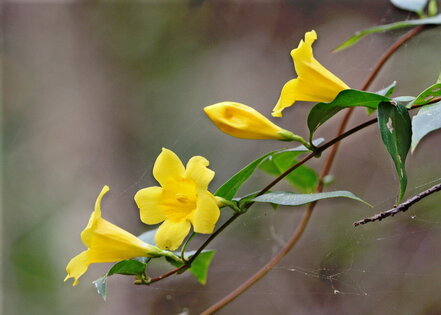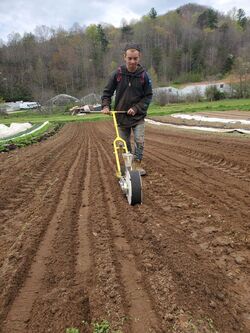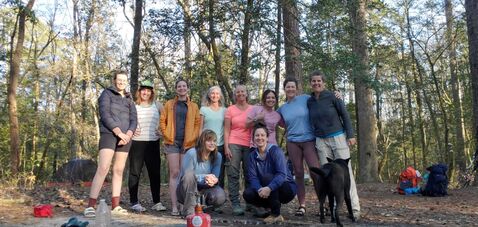 This weekend at the main season opening of the Hickory Farmers Market, a dad bought an armful of irises from which his young children plucked stems one by one and ran around giving them to people—mostly strangers. The young son, at one point, said something to his dad that I didn’t catch, to which his dad replied, “I know buddy, that’s why we’re out here practicing.” There was a man walking briskly through market alone. He was dressed in black jeans and boots and a black t-shirt that exposed his heavily tattooed arms, his ballcap pulled low. In some eras, we might have said he looked “tough”. But the young daughter stopped him in his tracks to hand him the flower she was holding and complimented one of his tattoos. Flabbergasted and smiling wide despite himself, he thanked her and ambled just a bit more slowly, with his head held just a bit higher, through the rest of the market. I can imagine all sorts of lessons that father with the flowers was hoping to teach his children, but I wonder if he understood the lesson they were teaching us: to remember to practice kindness. That kindness does not have to be big, or expensive, or even inconvenient. That it’s the tiny little kindnesses that hold us up in this world. A nod, a smile, just holding the door. I mean, pretty much everyone is perfectly capable of opening doors on our own, but we stop anyway to hold the door for the next person, no matter who they are, to signify kindness. To say, “I see you, fellow human, making your way in this world, and I am going to do this small thing to make that way just the tiniest bit easier for you because I, too, am human.” If you zoom out, you see the conglomeration of all those tiny little kindnesses. You see us recognizing and acknowledging our common humanity in each other. And so, when you find yourself at the brink of losing faith in that humanity, remember those children handing out flowers to strangers, quietly making a stranger’s day just a little bit brighter. Remember to notice the tiny little kindnesses that surround us as we move through the world. And then remember to practice.
0 Comments
 I never really noticed the Carolina Jessamine, despite its abundance, until a friend gave me the name. Suddenly, I was aware of every one, thousands of them. They had been there all along, of course, but unnamed things are easy to ignore. It is for this that I gather names. I do not wish to walk blindly through the world around me, never pausing to consider the anonymous life around me. Names are like a magical pair of eye glasses that bring a sudden focus. I can see at last! I want to exclaim. And behold! The wonders around me that I, presumably, have been missing all along. This is universal, I believe. By which I mean, it is not just for plants. For example, I once had never heard of Kratom. Then, a friend-a recovering heroin addict-explained its use in recovery to me, and suddenly, I began to see “Kratom” advertised ubiquitously. It had been this way for a long while, of course, but my ignorance of such made me blind to it. I suppose the same must be true of people, as well. I am a strong believer in name tags, especially in service establishments. This allows me to suddenly see “Clarissa” or “Josue” instead of blindly checking out my groceries without even noticing an actual person there (don’t even get me started on self-checkout!). And once I know Clarissa as a person rather than just the cashier, it’s likely that I’ll see her in other capacities in the community. You know, a human with an actual life beyond her job at the grocery store. And so, I go about gathering names these days. Trying to move slowly enough to discern the world around me, to keep the magical spectacles in place.  Spring is a big dance floor. Each of us moving in our own orbits, frenetic. For this moment it feels wild, chaotic, raucous, but the years have taught me the choreography of the whole. That each frenzy is but cog in the machine that is a farm. So much to be done by these sixteen hands, here, there, together, apart. Let your eyes glaze and the inchoate solidifies like a stereogram-the method to the madness, coaxing life from the ground up. From seeds one hand has sown, another transplanted, another cultivated, and yet another tended and harvested, another washed, and another eaten. This is what fuels our dancing. Each step, one in front of the other, sometimes mine, sometimes yours, to arrive again at the beginning. It is a nourishing thing, the growing of food. In both the obvious and obscure way. We come again each season, like wildlife to water, awakening to the dance of spring.  When I was a youth, my volleyball team would encircle our hands placed together in the middle and yell “tenacity!” on the count of three. It was just one of many things we shouted together as a demonstration of teamwork; I never thought too hard about it. We were a scrappy little team from a tiny town with little opportunity for early skills development. But we had tenacity. We went up against those big schools with their big-name coaches and their players that had been playing since they were knee high to a grasshopper (in our small town lingo), and we held our own. We would return to our tiny town and regale everyone with stories of how we scraped by in this match, or barely saved that match, how we avoided this team’s big time blocker, or fielded that team’s powerful smashes. The challenges we overcame. The hard won red-faced smiles. I thought about this recently while backpacking on the Neusiok Trail in eastern North Carolina with a group of women. This trail, that traverses highways, and incorporates some gravel roads into its length, is mostly suffering for some vague notion of comradery. Mutual suffering, that is. There were no long rewarding vistas, hardly any interesting plants, nothing but aching feet and mud soaked clothes, and a few bloody thorn wounds. But still, I would do it again. There’s something enticing about mutual suffering—the accomplishment of making it through. The hard won red-faced smiles. It's not unlike, I suppose, the hazing of brotherhoods. The closeness you feel to those who went through it with you. There is purpose to such madness, though it is never quite realized until after the fact, I think. Adversity is the story we tell, after all. With none such adversity, our lives might be quite content, indeed, but suffer instead from a dearth of stories. And since we’re made almost entirely of our stories, we must create adversity in its absence so that we become something. So, we take on unnecessary challenges like backpacking untold miles, trekking to the ends of the earth, climbing mountains, and the like. Challenges that, once overcome, result in hard won red-faced smiles. Smiles that contain the value of adversity, even manufactured adversity. This is true in our farming career as well. Farming can get rather routine and boring when everything goes according to plan. Fortunately, never does everything go according to plan when one is working with nature. Instead, we have plenty of stories to tell. We reminisce of high winds blowing down structures, floods washing away crops, the scrambles to protect sensitive crops from hard late freezes, and, yes, after we overcame those adversities together, the hard won red-faced smiles. |
AuthorWrite something about yourself. No need to be fancy, just an overview. Archives
July 2024
Categories |

 RSS Feed
RSS Feed